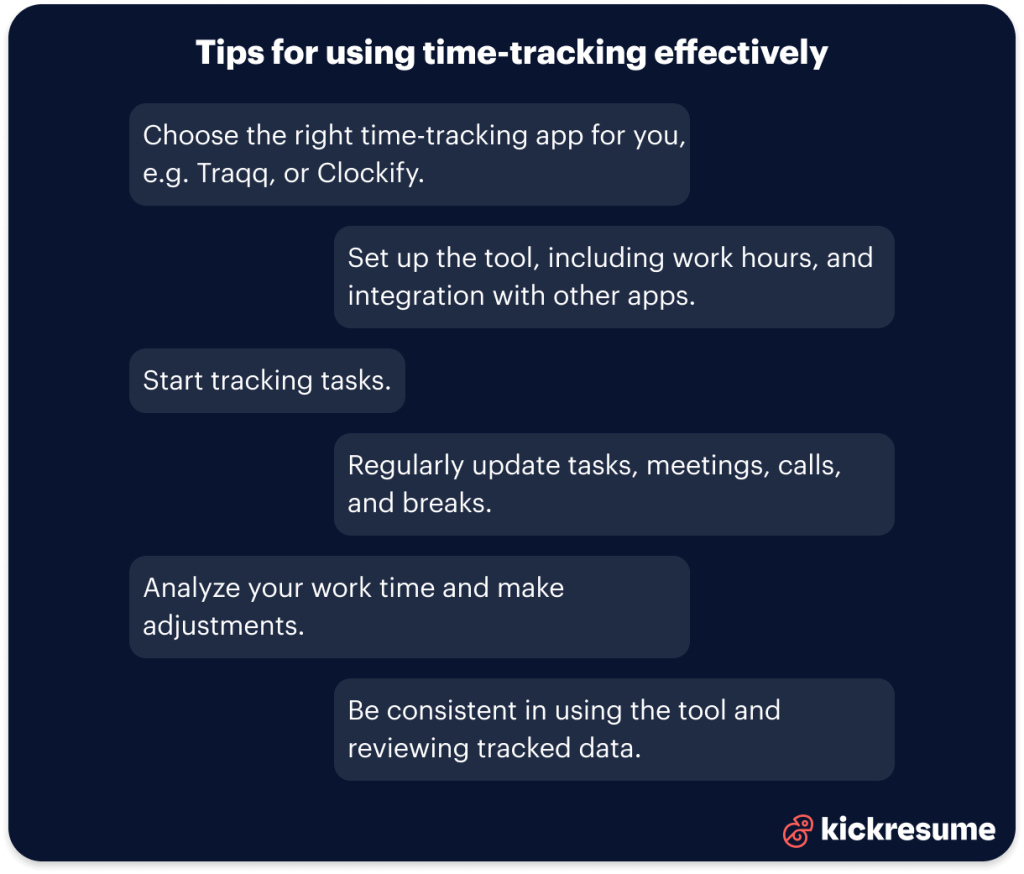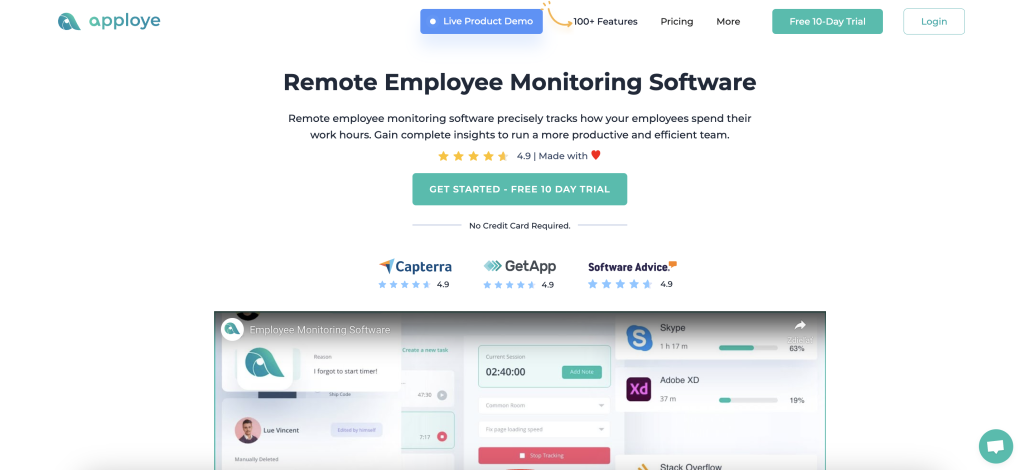Remote work offers a major perk: flexibility. With the opportunity to work remotely, you can enjoy the freedom of working from home or any location with an internet connection.
But remote work isn't all sunshine and rainbows. It comes with its fair share of challenges.
Missed deadlines, rushed work, distractions, time wasters, or low productivity — these are just a few of the struggles that remote workers often face. And let's not forget about the blurred boundaries between work and personal life.
That's when time tracking comes in handy. As scary and corporate as it may sound, it actually can be quite the opposite. Time tracking is a game-changer when it comes to managing your workload and finding work-life balance.
In this article, we're going to explore the benefits of time-tracking for remote workers and how it can help you maintain a healthy work-life balance.
Making the case for time-tracking
Research has shown a clear link between poor work-life balance and self-reported health issues.
It's like a domino effect: when one aspect of our lives is out of whack, it can start impacting other areas too.
That's why finding a good balance between work and personal activities is crucial for our physical and mental well-being. And one effective way to achieve that is quite simple — by tracking our work time so we don't end up working more than necessary.
There are more benefits to it, though:
- Setting clear boundaries: A healthy work-life balance is mostly about establishing clear boundaries between work hours and personal life. Time tracking tools allow you to define your working hours. When you know when to stop working, you can truly relax. The key is to follow a simple rule: no work when your time tracker is off.
- Communicating with colleagues and clients effectively: By accurately tracking and recording your work hours, you can set realistic expectations regarding your availability and schedule meetings during your work time.
- Analyzing productivity patterns: Are you a morning person, a night owl, or perhaps an after-lunch power worker? Time-tracking will help you discover your optimal work times so you can plan your tasks around them.
- Identifying time wasters: By visualizing exactly where your time goes, you can identify periods of the day where you’re most productive, and equally as important, when you're not. You can also identify unproductive habits and take the necessary steps to eliminate them. Whether it's spending too much time on social media, getting lost in unproductive meetings, or indulging in excessive breaks.
- Allocating time for personal activities: The researchers discovered that taking frequent micro-breaks to relax or socialize may increase your productivity. Time trackers may remind you to take regular breaks. And by analyzing tracked data, you can assess whether you're dedicating enough time to self-care and leisure.
Understanding time-tracking software
Time tracking apps are a game-changer when it comes to managing your time effectively and staying on top of your tasks.
These are some of most common features of time-tracking apps:
- Time logging: You can record the time you spend on tasks or projects, ensuring accurate tracking of your work hours.
- Project tracking: You can track the progress of various projects and get a clear overview of how much time you've dedicated to each one.
- Reporting and analytics: You get access to reports and analytics that visualize time data and your performance, helping you identify areas for improvement.
- Timesheet management: Digital timesheets make record-keeping a breeze, ensuring accurate and reliable documentation of your work hours.
- Client and task management: You can organize clients and tasks in one place, making it easier to allocate time slots to specific projects or orders.
- Integrations: Time tracking software often integrates seamlessly with other tools you use for work, creating a streamlined workflow.
- Invoicing and billing: You can invoice clients based on recorded time, eliminating the need for manual calculations and streamlining the billing process.
- Alerts and reminders: You can get reminders and alerts when it’s time to submit a task, take a break, or finish a project, helping you stay on track and meet deadlines.
In a nutshell, time-tracking software is like having a digital colleague that guides you in making the most of your work hours.
Whether you're a freelancer, a remote employee, or a business owner, a time tracker is likely to benefit both your work and personal life.

How to choose the right time-tracking tool
Now that you're convinced about the why of time-tracking, let's roll up our sleeves and dive into the how. And that begins with picking the right time-tracking tool.
Good news? There's a smorgasbord of great options available.
Tough part? Figuring out the one that fits you like a glove. So let's look at some factors to consider:
- Features: Look for essential features like task categorization, project tracking, and reporting.
- User-friendly interface: Opt for an app with an intuitive interface. The process of tracking time and accessing reports should be straightforward.
- Compatibility: Ensure that the tool works seamlessly with your devices and operating systems. Check if it supports web, mobile, or desktop platforms, depending on your preferences and work setup.
- Reporting and analytics: Assess the app's reporting and analytics capabilities. Seek out features that offer insights into your time usage, productivity trends, and project performance.
Flexibility and customization: It should accommodate different work styles and time entry methods (manual or automatic), and allow you to customize categories or tags to match your specific projects and tasks. - Security and privacy: Check if the tool has data encryption, secure cloud storage, and adherence to privacy regulations to ensure the confidentiality of your tracked time.
- Reputation: Research the app's reputation, check for any reported issues, and assess the level of support provided by the app's dev team.
With these things in mind, you can select a time-tracking app that suits your needs.
To make this a bit easier, we've hand-picked four popular options that are highly recommended for remote workers.
The top 4 time-tracking apps for remote workers
Among the top time-tracking apps we've found, these four stood out: Traqq, Apploye, Toggl, and Clockify.
1. Traqq
Traqq is an intuitive time-tracking tool for both remote and on-site teams and is an excellent choice for maintaining work-life fulfillment due to the following features:
- Shows your activity levels, allowing you to identify your peak productivity hours and when your fruitfulness starts to decline.
- The tool sends smart alerts that keep you in tune yet ensure you take regular breaks.
- Offers online and offline time tracking, letting you work on the go and in areas where Internet access is limited or doesn't exist.
- It automates billing and payroll calculation, helping you focus on the things you are best at.
- Also records your app and website usage, which can help you identify time wasters.
- Promotes ethical time tracking: its settings are flexible, and the screenshots and videos it saves are blurred, meaning your privacy is protected.
- Offers a totally free plan for freelancers and small teams.
Apploye is an advanced time tracking software that is designed to improve and accelerate remote team productivity.
Here's why it's beneficial for remote workers:
- Offers comprehensive time tracking, app tracking, live screenshots, and productivity monitoring.
- User-friendly interface with desktop, iOS, and Android apps for seamless cross-device use.
- Enables efficient task management, helping teams meet deadlines effectively.
- Provides accurate billing with task estimation, budgeting, and direct invoice generation.
- Allows custom report creation and timesheet exports for detailed productivity analysis.

3. Toggl
Toggl is a user-friendly time tracker that is quite popular among remote workers.
Here's why you can consider it helpful:
- Has a simple interface, so even PC novices won’t find it hard to get a grasp of it.
- It allows you to track time wherever your work — on your desktop PC, using your smartphone, on the web, etc. — and offers multiple integrations.
- Allows you to keep track of several projects at a time.
- Allows you to calculate the time needed for certain types of work.
4. Clockify
Clockify is a convenient option when it comes to tracking work time. Here's why remote workers are likely to benefit from using it:
- The tool offers a free version, which may be enough if you're only interested in the most basic features.
- Has 24-hour customer support, meaning all your concerns will be answered quickly.
- You can quickly log in activities thanks to templates and submit and approve timesheets.
- Sends you reminders for due timesheets.
- You can track your breaks and sign in with a personal code.
Tips on how to use time-tracking right
Once you've found a time-tracking tool, don't pop the champagne just yet.
Having the tool is one thing, using it is the second, right? Here's how you make sure you're making the most out of your tool:
- Download and install
Once you've chosen the tool that suits your needs the best, download, and install it on your device. Make sure you understand its working, the features it has, and how it can be customized.
- Set up the tool
If the tool provides, set up your work hours, integration with other applications (like calendars, project management apps), fill in essential details about projects or tasks, and, if required, share the access with your team or employer.
- Start tracking
Start to use the tool by constantly inputting your tasks and the time you're devoting to each task.
- Regularly update your tasks
Ensure you're recording all your tasks, how much time you've spent on each task every day. This doesn't only mean client work, but also meetings, phone calls, breaks, etc.
- Analyze your work time
Use the tool's report feature to analyze how you're spending your time. Look for patterns in where your most productive hours are and which tasks take up the most time. Based on your analysis, make the necessary adjustments. If you find you're spending too much time on a specific task, look for ways to streamline it or improve your efficiency.
- Be consistent
Consistency is the name of the game. Make time-tracking a part of your daily routine — start and stop the timer each time you begin and finish a task. Make a habit of it, and soon you'll be doing it without even thinking. Also, regularly repeat steps 4-5. Regularly reviewing your tracked data and adjusting accordingly will help you constantly improve your work schedule and productivity.
Remember, time tracking isn't about micro-managing every minute of your day. It's about understanding how your time is spent so you can make better decisions and work more productively.
Key takeaways: Empower your time management
To sum it up, time tracking isn't the enemy — it's your ally in the quest for productivity and work-life balance.
- It provides insights into how you spend your work time, your work patterns, and productivity levels, empowering you to make informed decisions.
- It can be your reliable companion when it comes to identifying time wasters and managing your schedule effectively. As a result, you can set clearer boundaries and strike a healthier work-life balance.
- There are quite a few time-tracking tools for remote workers on the market, and the choice depends on your specific goals and needs. We recommend you to opt for an app that's intuitive, ethical and helps you increase productivity while promoting healthy work routines.



